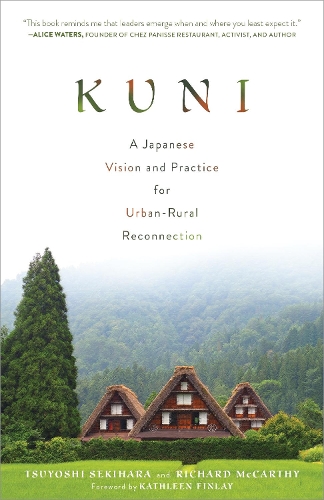
Kuni: A Japanese Vision and Practice for Urban-Rural Reconnection
(Paperback)
Publishing Details
Kuni: A Japanese Vision and Practice for Urban-Rural Reconnection
By (Author) Tsuyoshi Sekihara
North Atlantic Books,U.S.
North Atlantic Books,U.S.
29th November 2022
20th October 2022
United States
Classifications
General
Non Fiction
307.26
Physical Properties
Paperback
160
Width 140mm, Height 216mm
Description
"Reading Kuni makes me want to dive into rural Japan...this book reminds me that leaders emerge when and where you least expect it." - ALICE WATERS, founder of Chez Panisse restaurant, activist, and author A guide to reviving and revitalizing forgotten places and communities through the Japanese principles of kuni Kuni offers a unique model for the revitalization of rural and deindustrialized lands and communities--and shares lessons in citizen-led regeneration for all of us, regardless of where we live. "Kuni" is both a reimagining of the Japanese word for nation and an approach to reviving communities. It shows what happens when dedicated people band together and invest their hearts, minds, and souls back into a community, modeling a new way of living that actually works. A kuni can be created anywhere--even a hamlet on the verge of extinction--and embodies 7 key principles- Everyone is equal in a kuniKuni is equipped with a Regional Management Organization--a democratic organization that takes care of small public servicesKuni is a link between residents and repeat visitorsLife in a kuni is circular--consumption and production are in balanceKuni embraces the whole personKuni can be a place for young people who seek interconnectednessThe time for kuni is now Kuni offers a compelling vision of regenerative relationships that can take root in the United States--and anywhere. With spare and beautiful prose and useful principles for reviving rural places, this book addresses our longing for a hopeful revolution of everyday life.
Reviews
Reading Kuni makes me want to dive into rural Japan. Heartbreaking in many ways, this book reminds me that leaders emerge when and where you least expect it.
ALICE WATERS, founder of Chez Panisse restaurant, activist, and author
Mr. Tsuyoshi Sekihara is not a scholar. But in a different era, he would have been.... If society understands the value of his work, it will be a sign that it has become a little better.
KUMI SEIKE, professor at Ritsumeikan Asia Pacific University
We need more kunihealing and bridging between people divided by geography. From Japan to the Americas, forgotten rural communities desperately need new paths to forge a future.
RICARDO SALVADOR, senior scientist and director of the Food and Environment Program at the
Union of Concerned Scientists
What are the universal values common to all humanity In a kunia place full of vitality and where humans have pride and free willindividuals continually engage in courageous practice and never cease to question their work. In Tsuyoshi Sekiharas new theory of kuni, we find signs of light that will help us survive in this difficult time.
TAKAO AOKI, board chair of KODO Group/ Kitamaesen Co., Ltd.
This is a much-needed and hugely attractive ideaor set of ideasfor overcoming the rural/urban divide, which sadly does exist and usually breeds a lack of understanding that goes both ways.
DEBORAH MADISON, cookbook author and chef
I am immensely proud of Kuni. This book is the outcome of a multi-year US-Japan rural exchange program and is a testament to how exchange programs can positively impact international dialogue and understanding and help innovative leaders see their work in new, illuminating, and fresh ways. Kudos to Richard McCarthy and Tsuyoshi Sekihara, who generously wrote this book so that others working on the rural-urban divide can benefit from their expertise and experience.
AMBASSADOR MOTOATSU SAKURAI, president emeritus of Japan Society, Inc.
This remarkable East meets West manifesto for the best of an enlightened globalization may bring us all back to where we should be: home. Sekihara and McCarthy urge us to return home, to defend fragile rural places that our criminal food system plunders. Best read over rice dishes.
CARLO PETRINI, founder of Slow Food
In Kuni, we witness how valuable community-level exchanges between the United States and Japan can be to facilitate sharing of lessons learned and best practices on common challenges facing our two countries. As two innovative leaders of their respective societies, McCarthy and Sekihara not only help shed light on a key issue of concern shared by the United States and Japan, but also encourage us all that important ideas and experiences are being shared between the two countries to strengthen urban-rural ties and help rural communities thrive. Their collaboration is an exceptional manifestation of sub-national exchanges that form a strong foundation for an enduring US-Japan relationship, and will also be a significant resource for rural revitalization efforts in communities around the world.
KAZUYO KATO, executive director of Japan Center for International Exchange (JCIE/USA)
Richard McCarthy is one the most playful and ground-breaking thought leaders in the Americas.
GARY NABHAN, ethnobotanist and author
Author Bio
TSUYOSHI SEKIHARA is founder of the Kamiechigo Yamazato Fan Club, a community development organization focused on the holistic revival of Japan's rural areas. Under Sekihara's leadership, Kamiechigo became a program model for Japan's Ministry of Agriculture, Forestry and Fisheries. In 2019, he traveled to New York City to feature in three days of symposia at the Japan Society. For 25+ years, RICHARD MCCARTHY has played both hyper local and global roles in growing community through food. His innovations include- a workers' cooperative with public housing residents; the nation's first farmers market health incentive pilots; and an international research fellowship to measure the human, social, and financial capital in community markets. McCarthy's work has become increasingly global through partnerships with the UN World Summit on Sustainable Development, Project for Public Spaces, and Slow Food. He is a frequent public speaker, author, and organizer of conferences, symposia, and festivals.
